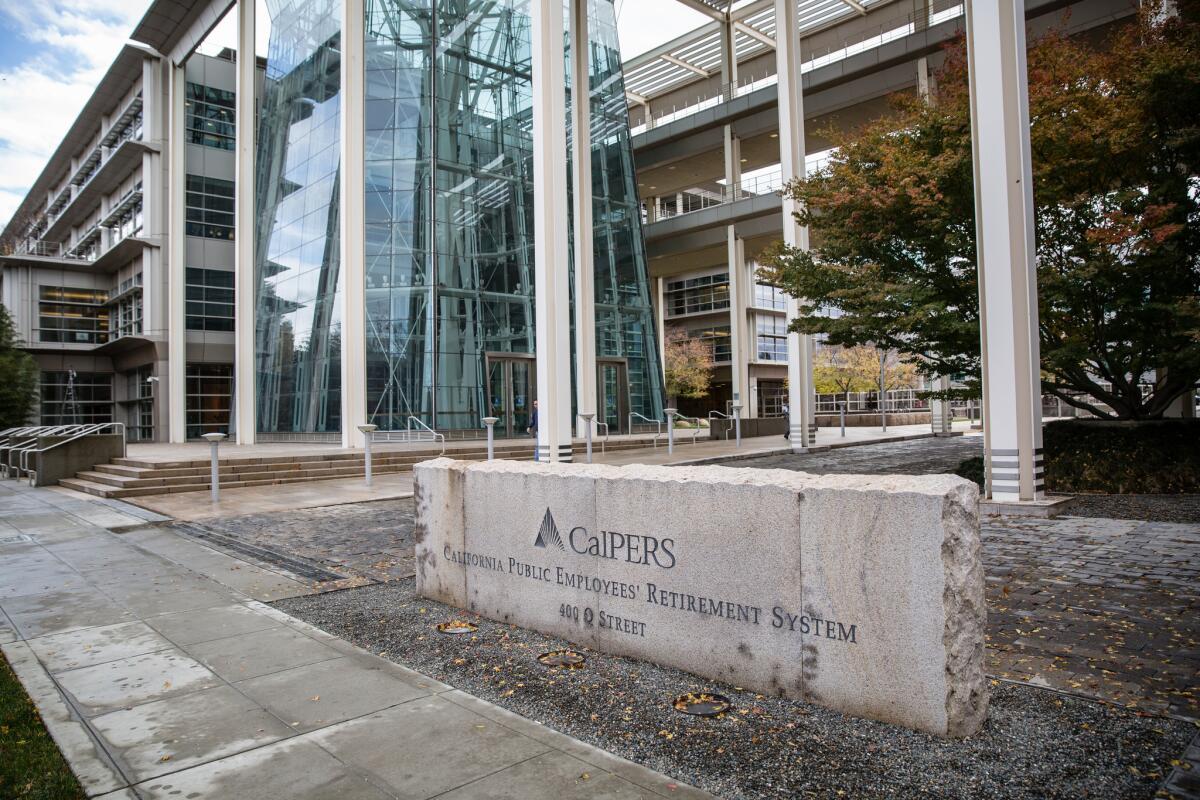Are private equity investments worth the risk? CalPERS to weigh pros and cons

The California Public Employees’ Retirement System has devoted about $28 billion, or nearly 10% of its total portfolio, to private equity deals.
- Share via
The nation’s largest public pension fund will take a deep look Monday into its private equity investments, against a backdrop of growing criticism over the risky and controversial sector.
The California Public Employees’ Retirement System has devoted about $28 billion, or nearly 10% of its total portfolio, to private equity deals and has reaped big gains from the sector, which finances start-ups, leveraged buyouts and other deals.
Yet the segment’s performance has been subpar compared with its risks, as measured by its benchmark. Those investments earned a seemingly healthy 8.9% last year, but that was lower than the 11.1% benchmark.
That has opened the door to critics who say that the investment class isn’t worth the trouble and that CalPERS has put itself at risk of outsized future losses — which taxpayers would have to cover.
“CalPERS would have done better in the last decade by investing in a stock market index fund,” said Eileen Appelbaum, senior economist at the Center for Economic and Policy Research, a Washington think tank.
A recent report by CalPERS’ main consultant acknowledged that the private equity investments failed to beat benchmarks over the last one, three, five and 10 years, important measures that seek to account for the added risk that comes with complicated and cumbersome assets.
Still, Pension Consulting Alliance strongly endorsed the commitment to private equity and praised CalPERS’ ability to handle that portfolio. “It has clearly fulfilled its role of enhancing long-term returns in the portfolio,” the PCA report said.
The stakes are large.
As with other pension funds, CalPERS relies on private equity to meet its ambitious annual return target of 7.5% on its total $293-billion fund and keep pace with ever-growing obligations to its 1.7 million current and future retirees. When investment returns fall short, the system turns to taxpayers to make up the shortfall.
Private equity poses a particular conundrum for CalPERS and other public pension funds facing criticism that private equity fees are too high, investments are too complex and disclosures are murky, at best.
CalPERS has announced, for instance, that later this year it will disclose for the first time the amount it has paid private equity firms over the years in performance fees, known as carried interest. The figure is expected to be in the billions.
It also is discussing a plan to move more of its total $293-billion fund to bonds and other more conservative investments, though such a change would be made slowly over the coming decades. The California State Teachers Retirement System, the nation’s second-largest public pension fund, already is considering a new strategy that would shift up to 12% of its $191-billion portfolio into safer investments.
Meanwhile, the Securities and Exchange Commission has stepped up scrutiny of the private equity industry, focusing in part on the fees the firms charge.
CalPERS defends its private equity investments, saying the segment, in general, has performed well for a long time. “It’s generating real returns for our members, which is exactly what it’s supposed to do,” said Joe DeAnda, a CalPERS spokesman. “It’s real value that we don’t feel there’s another way to achieve.”
The fund’s private equity investment gains have been impressive. The segment returned 11.9% annually over the 10 years ended June 30, compared with 6.6% for CalPERS’ stock portfolio, and it did better than CalPERS’ public stocks over all relevant periods.
Over the last fiscal year, for instance, the private equity portfolio’s 8.9% return blew away the public stock portfolio, which returned an anemic 1%. It was private equity, along with an even more impressive 16.9% return on real estate investments, that helped CalPERS eke out a total 2.4% return.
Analysts caution that private equity has benefited from two factors that probably won’t last: low borrowing costs and a rising stock market that boosts public offerings of private equity-owned companies.
“The U.S. stock market has been at or near record highs,” Appelbaum said. “Private equity can sell portfolio companies at high prices.”
The PCA report on CalPERS’ private equity results noted that the problem wasn’t with the investments; it was with the benchmark, which includes a combination of indexes of global and U.S. public stocks. PCA said the fact the benchmark has changed several times shows the difficulty of trying to measure an asset class that doesn’t trade on public markets.
“Simply looking at the PE program’s performance relative to the policy benchmark does not paint a complete picture,” the report said.
But Appelbaum said the benchmark is fine. It’s CalPERS’ focus on absolute returns that’s misplaced, she said.
“They have chosen a perfectly reasonable stock market index” as a benchmark, she said. “They failed to beat it at year-to-date, three-year, five-year and 10-year frames.”
Its private equity segment narrowly beat the 20-year benchmark.
For its part, CalPERS has acknowledged that the hidebound private equity industry needs to change. The PCA report agreed that much of the criticism of the industry is justified.
“Fees are too high, not enough information is being disclosed to investors and terms of most partnership agreements strongly favor the managers,” the report said.
The industry pointed out, however, that private equity is helping pension funds meet their obligations.
“This excellent performance over the long term is a major reason why pensions are the biggest investors in private equity,” said James Maloney, a spokesman for the Private Equity Growth Capital Council, a Washington trade group.
More to Read
Inside the business of entertainment
The Wide Shot brings you news, analysis and insights on everything from streaming wars to production — and what it all means for the future.
You may occasionally receive promotional content from the Los Angeles Times.











